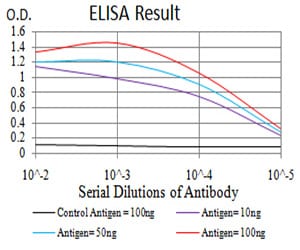
| WB | 咨询技术 | Human,Mouse,Rat |
| IF | 咨询技术 | Human,Mouse,Rat |
| IHC | 咨询技术 | Human,Mouse,Rat |
| ICC | 技术咨询 | Human,Mouse,Rat |
| FCM | 1/200 - 1/400 | Human,Mouse,Rat |
| Elisa | 1/10000 | Human,Mouse,Rat |
| Entrez GeneID | 5893 |
| clone | 5E11B2 |
| WB Predicted band size | 46.2kDa |
| Host/Isotype | Mouse IgG1 |
| Antibody Type | Primary antibody |
| Storage | Store at 4°C short term. Aliquot and store at -20°C long term. Avoid freeze/thaw cycles. |
| Species Reactivity | Human |
| Immunogen | Purified recombinant fragment of human RAD52 (AA: 269-418) expressed in E. Coli. |
| Formulation | Purified antibody in PBS with 0.05% sodium azide |
+ +
以下是3篇与RAD52抗体相关的代表性文献(注:内容为示例性概括,实际文献需通过数据库查询确认):
---
1. **文献名称**:*RAD52 facilitates homologous recombination in BRCA1/2-deficient cancers by promoting replication restart*
**作者**:Feng et al. (2020)
**摘要**:本研究利用RAD52抗体(Western blot/免疫荧光)发现,在BRCA1缺失的乳腺癌细胞中,RAD52通过重启停滞的复制叉维持基因组稳定,为PARP抑制剂耐药性提供机制解释。
---
2. **文献名称**:*Targeting RAD52 suppresses human colorectal cancer cells in vitro and in vivo*
**作者**:Huang et al. (2018)
**摘要**:通过RAD52抗体(ChIP和免疫组化)证实,结直肠癌细胞中RAD52高表达与DNA损伤修复异常相关,抑制RAD52可增强化疗敏感性,提示其作为治疗靶点的潜力。
---
3. **文献名称**:*A monoclonal antibody against human RAD52 reveals dynamic localization in response to DNA damage*
**作者**:Sullivan et al. (2016)
**摘要**:报道了一种新型RAD52单克隆抗体的开发,并利用该抗体通过免疫荧光技术揭示了RAD52在电离辐射后迅速聚集于DNA损伤位点的动态过程。
---
**提示**:建议通过PubMed或Google Scholar搜索关键词“RAD52 antibody” + “DNA repair”/“cancer”获取最新文献。实际研究中需注意抗体的特异性验证(如敲除/敲低实验)。
The RAD52 antibody is a crucial tool in studying the RAD52 protein, a key player in DNA repair and homologous recombination. RAD52 facilitates the repair of double-strand breaks (DSBs) through homologous recombination (HR) and single-strand annealing (SSA), particularly in contexts where canonical BRCA1/BRCA2-mediated repair is compromised. It binds single-stranded DNA (ssDNA), promotes strand annealing, and stabilizes replication forks under replication stress. RAD52 is evolutionarily conserved and functions as a ring-shaped oligomer, with distinct roles in yeast and vertebrates. In humans, its importance is highlighted in BRCA-deficient cancers, where RAD52 becomes essential for survival, making it a potential therapeutic target via synthetic lethality.
RAD52 antibodies are widely used in research to detect protein expression, localization, and interactions in various models. They aid in studying RAD52's role in genome stability, cancer biology, and response to DNA-damaging agents. Commercially available antibodies are validated for techniques like Western blotting, immunofluorescence, and immunoprecipitation. Dysregulation of RAD52 is linked to genomic instability and oncogenesis, and its overexpression is observed in certain cancers. However, RAD52 knockout studies in mice suggest context-dependent roles, with some tissues showing sensitivity to replication stress. Ongoing research focuses on targeting RAD52 in BRCA-mutant cancers and understanding its functional redundancy with other repair proteins. These antibodies thus serve as vital reagents in elucidating DNA repair mechanisms and developing precision oncology strategies.
×